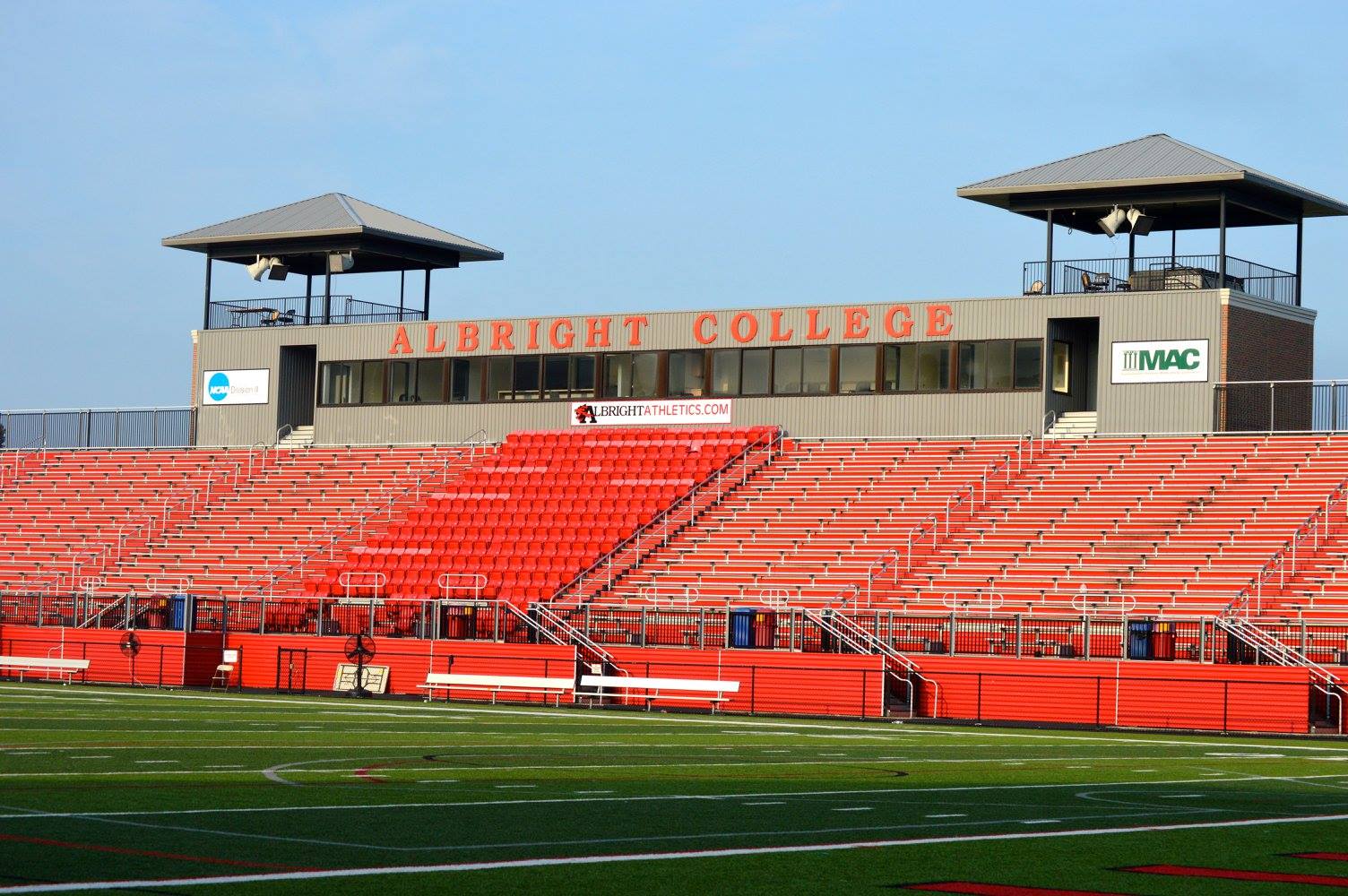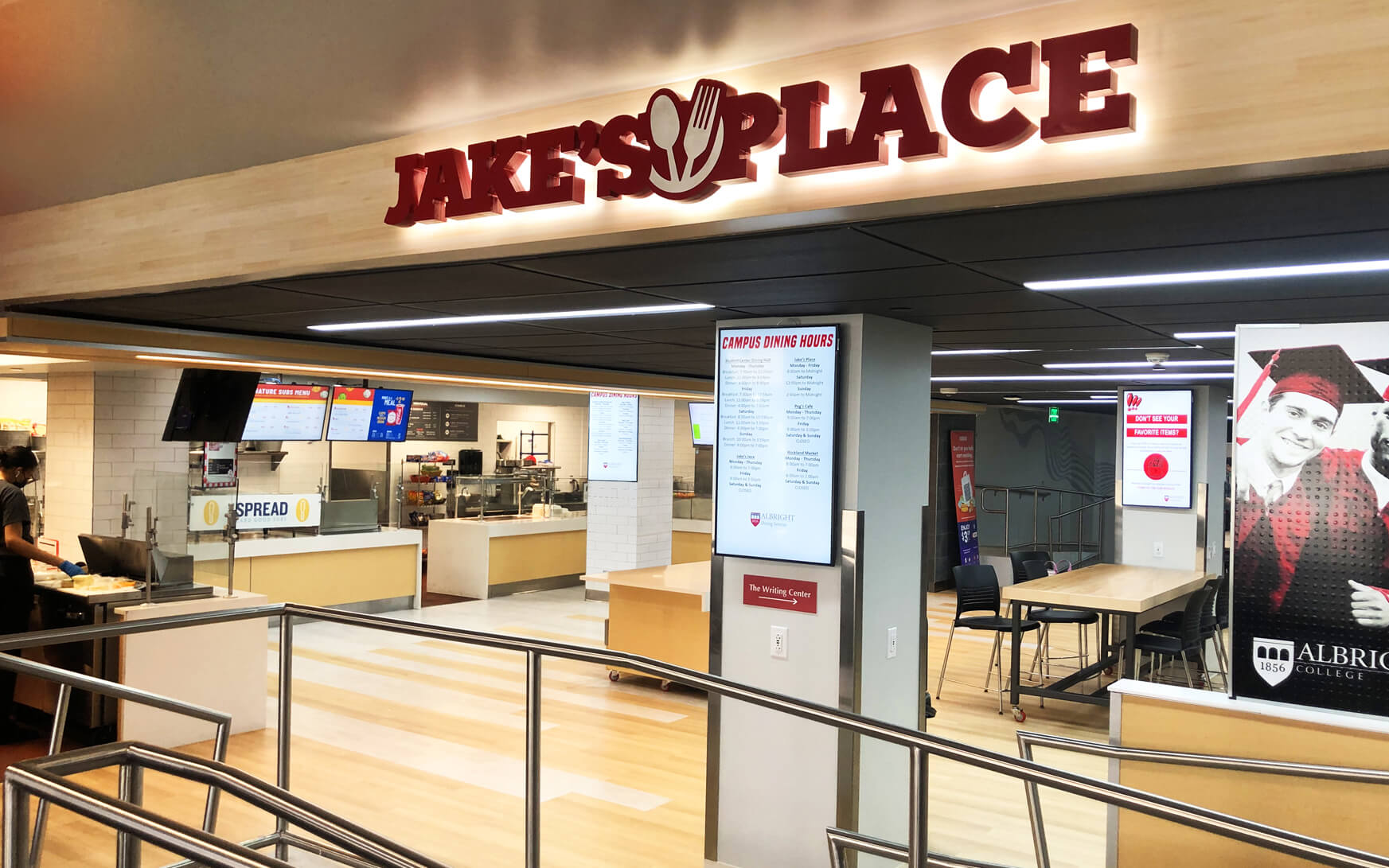MUS 103C: Jazz Combos
The Jazz Combos rehearse weekly and performs at least one concert per semester. These groups focus on a variety of jazz styles, performing music representative of many eras of jazz history, with emphasis on small ensemble performance and improvisation. The bands perform contemporary as well as classic tunes from the jazz repertoire, with attention to proper performance techniques. Membership and placement are determined by audition. Students wishing to participate in a Jazz Combo as a non-credited course must fulfill credited class requirements and have permission of the director.
MUS 103D: Rap Collective
The Albright Rap Collective (ARC) is a multidisciplinary workshop consisting of rappers, producers (beatmakers), visual artists, and dancers. Members of the group meet three times a week, developing skills in their respective areas of practice through creative workshops, peer review sessions, critical listening sessions, and performance preparation. ARC performs original compositions, as well as repertoire from the history of hip-hop from the late 1970s and early 80s to the present. Each semester, the group will perform at two to three on- and off-campus events.
MUS 113: Rags, Rock and Rap: Popular Music and American Culture
This course explores the genesis of popular music in English-speaking North America from the colonial period to the present, with emphasis on the period beginning in the 1890s just before the breakout of jazz, to the present-day multi-billion dollar industry of rock, pop, R&B, rap/hip-hop, country, dance/electronica and the emergent world styles that also form part of the evolving contemporary American musical scene. Lectures place equal emphasis on the musical styles themselves and their social context, including the role of composers, audiences, promoters, money, and music industry organizations. Lectures and discussion are enlivened by diverse music listening experiences. Satisfies General Studies: Foundations (Fine Arts) requirement.
MUS 121: Black Popular Music
This course surveys, investigates, & analyzes black popular music from the 19th century to the present. Through critical listening habits & analytical thinking skills, students will explore black popular culture as means of expression, communication, & collective identity, attending to issues of representation, identity, values, & aesthetics through a wide range of interdisciplinary sources & methodologies. This course material will emphasize intersections of creativity, technology, & performance, along with the impact of music industry, audience reception, & cultural politics. In addition to daily exercises, students will complete discussion forums in which they will apply critical thinking to synthesize material, complete comparative analyses, relate individual lessons to key course themes, & connect the curriculum to their own experiences & musical listening practices. Satisfies General Studies: Foundations (Humanities) requirement.
MUS 125: All That Jazz
This course covers jazz history from its obscure origins in the post-Civil War period to the present. The focus is on important instrumentalists and vocalists of the 20th century, and how they helped to create the different jazz and jazz-related styles, including: ragtime, blues, hot jazz, Dixieland, swing, bebop, cool jazz, free jazz and jazz fusion. Among the key performers and composers to be discussed are Louis Armstrong, Jelly Roll Morton, Duke Ellington, Billie Holiday, Benny Goodman, Charlie Parker, Miles Davis, Dave Brubeck, Herbie Hancock and Keith Jarrett. Basic concepts of jazz performance and various jazz styles are explored through independent research, listening and discussion. When possible, field trips to live jazz performances are incorporated. Satisfies General Studies: Foundations (Fine Arts) requirement
MUS 284: Popular Music and Digital Culture
This course explores the interrelationships between commercial popular music and digital culture in the late twentieth and early twenty-first centuries. Students will explore issues such as gender and identity in popular music, the remix as cultural practice, the politics of digital sampling, hip-hop and dance music in Post-Ferguson America, the relationship between music and interactive media such as video games, and globalization in the age of cloud computing. By combining critical listening skills with original research and writing, students will engage core debates within popular music and digital media studies. General Studies: Connections-Global-Humanities
ENG 210
African-American Literature
A survey and analysis course divided into rubrics of period, activity and/or genre designed to acquaint the student with the formal links and traditions within African-American literature, including drama, the short story, poetry and nonfictional prose. Offered alternate fall semesters. CONNECTIONS-HUMANITIES
ENG 235
Major Authors and Topics
The premise of these courses is that writers make connections between their traditions and ways of thought in order to define the value systems that produce their particular culture and identity. Each section of the course provides students with the opportunity to focus on and to understand a distinct group, defined by geography, by historical period, or by class, race, ethnicity, gender, or nationality. May be repeated with a new topic. Prerequisite: ENG 102 CONNECTIONS-HUMANITIES
ENG 390
Topics in British and American Literature
This course explores a topic or central problem of current importance in literary study. This course may focus on the work of major writers such as Virginia Woolf, Henry James or Joseph Conrad. In some semesters the course will focus on themes, genres, and traditions in American and British literature such as “The Gothic,” “Harlem Renaissance,” “Mythology,” and “Women’s Fiction.”
HIS 212
African American History I
This course is the study of the African experience in America starting with pre-colonial Africa through the abolition of the slave trade and ending with emancipation in 1865. Taking a linear approach, this course will expose African American involvement in the American Revolution, free Black life in the new republic, and how slavery transformed and hardened during antebellum. The course will focus heavily on the slave trade and institution of American slavery paying special attention to the plantation-complex. Taking an intersectionality approach, this course will examine how race, gender, class, and region created a heterogenous African American experience. The theme of Black resistance undergirds the entire course. The aim of the course is to carefully review the facts of the early Black experience, expose the many myths, recognize the horrors and effects of bigotry and intolerance that were present and forming, and apply this information to our understanding of black/white conditions today. Documentary films, feature films, analytical essays, discussion-based lectures, guest speakers, and a class trip will be the sources that lead to an understanding of this important subject. GENERAL STUDIES FOUNDATIONS HUMANITIES
HIS 324
African Americans and the Great Migration
This course centers on what is commonly called the “Great Migration,” a period in American history where 6 million African Americans migrated out of the rural south to southern cities, northern cities and out West. This course will first start in the south by unpacking the WWI era racial and regional politics that created this migration examining closely the push and pull migration factors, i.e. what social/cultural norms, economic/legal barriers pushed Black women and men out of the rural south and what social awareness, economic opportunities, and freedoms pulled them to the cities and out West. This course will explore the connections between this out-migration and the larger struggle for freedom, namely the Civil Rights Movement. This course will also use a gendered lens in which to understand the racial, regional and urban politics experienced by Black migrants paying special attention to how each shifts gender ideology and gendered roles. CONNECTIONS-HUMANITIES
HIS 352
Africans in the Making of the Atlantic World: Explorations in the History of the Black Diaspora from Sao Tome to Saint Domingue
A majority of the persons who migrated to the Americas before 1800 came from Africa. Very few of them came willingly, but without their economic and cultural contributions the world we know today would not have come into being. The goal of this course is to begin to understand the experiences and achievements of these Africans and their descendants in four regions of the Atlantic world – Africa itself, Brazil, the West Indies and the Chesapeake – between the mid- 15th century and the revolutionary struggle for Haitian independence at the beginning of the 19th century. General Studies Connections-Global-Humanities
Show less 



